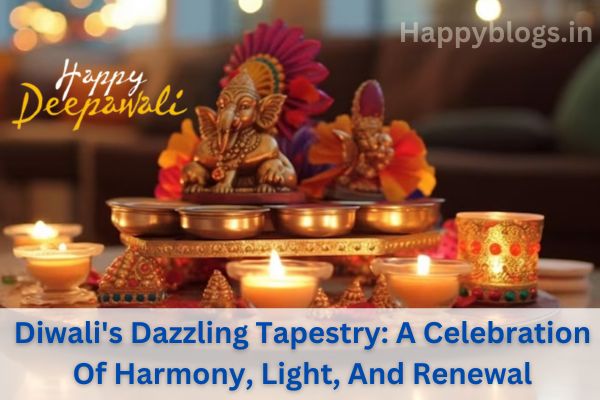Diwali’s Dazzling Tapestry: A Celebration Of Harmony, Light, And Renewal

Millions of people around the world are illuminated in the hearts and minds by the spirit of Diwali, the festival of lights, as the air fills with an enticing vibrancy and streets and homes are decked with a multitude of lights. Diwali, a festival observed by Sikhs, Jains, Hindus, and certain Buddhists, crosses religious lines to represent the spirit of peace, optimism, and rebirth.
Historical Tapestries: Their History and Importance
With its origins well ingrained in folklore and antiquated mythology, Diwali represents diverse stories in several parts of India. Many people celebrate it as the day that Lord Rama, the personification of justice and morality, returned from his banishment following his victory over the demon king Ravana. In a different context, it represents the veneration of Lakshmi, the goddess of wealth, who brings luck and prosperity.
A Chorus of Lights: Bringing Light to the Shadows
The main feature of Diwali is the display of lights, with houses decked out in bright lamps, candles, and ornaments. The illumination heralds the triumph of good over evil and represents the victory of light over darkness, eliminating ignorance. Fireworks light up the night sky, transforming it into a vibrant canvas that spreads happiness and celebration.
Family, Community, and Joyful Holidays
Families should get together, rekindle their relationship, and celebrate Diwali. The holiday is filled with warmth and affection, from cooking delicious sweets and savory meals to sharing gifts. A sense of unity and camaraderie is fostered by the laughter, conversation, and smells of traditional meals that mark the celebration.
Customs and Rituals: Offerings and Honoring Cultural Traditions
Carefully cleaning the house before the festival begins is a symbol of new beginnings and a clean slate. Families offer prayers, or puja, to the gods in hopes of receiving their blessings for wealth and health. Giving and receiving presents, as well as exchanging sweets, are symbols of friendship and the strengthening of ties between family members.
International Remembrance and Mutual Joy
Diwali’s embrace unites people all throughout the world, regardless of geographic boundaries. People from all cultures and backgrounds acknowledge and appreciate its significance, which is felt in many regions of the world. The festival’s global appeal is demonstrated by the fact that streets and sites outside of India frequently sparkle with lights and colorful celebrations.
Accepting Renewal and Hope
Fundamentally, Diwali is a festival of hope, the victory of light over darkness, and the rebirth of life’s vitality. It acts as a prompt to chase away negativity, welcome positivity, and set off on a path of personal development and spiritual advancement.
An atmosphere of optimism and uplifted spirits is left behind as the festival draws to an end with the lingering sounds of happiness, the glow of lights, and a sense of community. With its diverse cultural heritage, Diwali is a symbol of harmony, festivity, and the moral triumph that never goes away.






